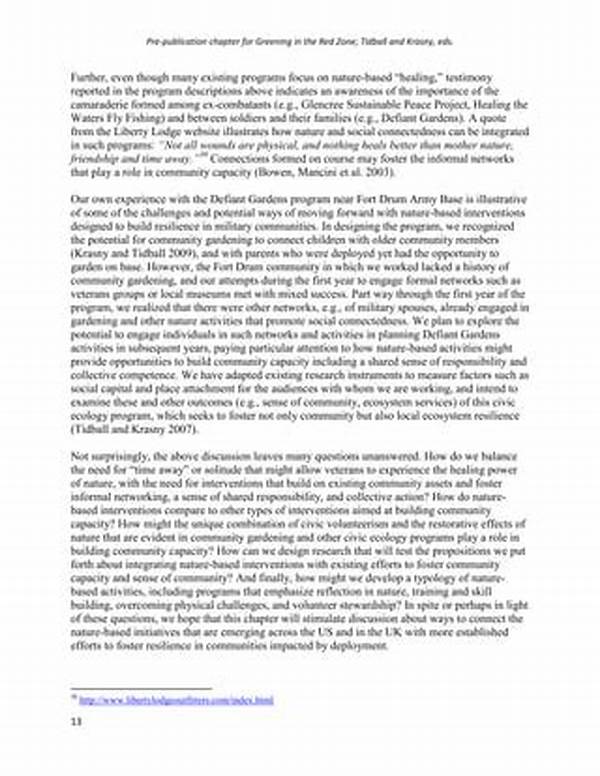The intricate balance of ecosystems is frequently disrupted by various external influences, notably military interventions. These interventions can have profound and transformative effects on the environment, challenging the resilience of ecosystems to recover from the ensuing damage. Understanding the dynamics of ecosystem resilience to military interventions is paramount in creating strategies to mitigate the environmental impact and ensure sustainable recovery.
The Environmental Impact of Military Activities
Military interventions are often accompanied by significant environmental disturbances. The movement of troops, the construction of military infrastructure, and the usage of heavy artillery can lead to habitat destruction, pollution, and biodiversity loss. The resilience of ecosystems to these changes depends largely on their ability to adapt to new conditions and restore ecological balance. Ecosystem resilience to military interventions involves complex interactions among various biotic and abiotic factors, which influence the recovery trajectory. Conservation efforts and strategic planning are essential in enhancing this resilience, ensuring that ecosystems can recuperate and sustain their ecological functions despite military pressures. Addressing the challenges posed by military interventions requires a comprehensive understanding of ecological processes and the implementation of sustainable practices to protect and restore affected environments.
Strategies for Enhancing Ecosystem Resilience
1. Restoration Initiatives: Implementing ecosystem restoration projects can aid in recovering habitats affected by military interventions. This approach helps restore ecological functionality.
2. Pollution Management: Effective waste management and pollution control measures are crucial in minimizing environmental degradation during military activities.
3. Biodiversity Conservation: Protecting existing biodiversity plays a pivotal role in maintaining ecosystem resilience to military interventions, offering a buffer against disturbances.
4. Collaborative Governance: Involving local communities and governments in decision-making enhances adaptive management and strengthens ecosystem resilience to military interventions.
5. Research and Monitoring: Continuous research and monitoring are essential to understand the long-term impact of military interventions on ecosystems, allowing for informed decision-making and adaptive management strategies.
Case Studies of Affected Ecosystems
Globally, several ecosystems have faced challenges due to military interventions, revealing insights into their resilience mechanisms. For instance, wetlands in conflict zones often experience changes in water quality and biodiversity. However, these ecosystems demonstrate formidable resilience, leveraging their natural regenerative capabilities to withstand adverse conditions. Studying such cases contributes to the broader understanding of ecosystem resilience to military interventions, highlighting both vulnerabilities and strengths. Rigorous research and data collection are imperative to tailor specific intervention strategies and drive conversation efforts aimed at bolstering ecological resilience. Facilitating cross-disciplinary collaboration can further refine these strategies, integrating scientific knowledge with local experiences to enhance ecosystem recovery.
Challenges in Assessing Resilience
Evaluating the resilience of ecosystems to military interventions presents several challenges. First, the complexity of ecological networks makes it difficult to predict recovery outcomes precisely. Additionally, the variability in military activities’ impact across different ecosystems complicates the assessment of resilience. Assessments must account for diverse factors, including species diversity, ecological interactions, and the degree of disturbance. Innovative methodologies, such as advanced remote sensing and ecological modeling, provide valuable tools for assessing ecosystem resilience. These tools offer insights into the progression of ecological recovery, enabling environmental scientists and policy-makers to formulate effective conservation strategies that address the unique challenges faced by ecosystems impacted by military interventions. Collectively, these efforts contribute to a more comprehensive understanding of ecosystem resilience dynamics, furthering environmental protection objectives.
Policy Implications and Recommendations
To enhance ecosystem resilience to military interventions, policy frameworks must be adapted to incorporate environmental considerations in military planning. This involves integrating environmental impact assessments in defense strategies to pre-emptively identify potential ecological repercussions. Additionally, promoting international cooperation on environmental conservation can foster knowledge-sharing and bolster resilience-building efforts across borders. Countries should prioritize the adoption of eco-friendly technologies and sustainable practices within military operations to mitigate environmental damage and support ecosystem recovery. Collaborative initiatives that bridge military, governmental, and environmental organizations are vital in crafting robust policies that safeguard ecological integrity. Ultimately, fostering a commitment to sustainable military practices and ecosystem resilience is essential for preserving global biodiversity and ensuring ecological sustainability.
Future Directions in Research and Practice
Innovations in ecological research and practice are instrumental in propelling efforts to enhance ecosystem resilience to military interventions. Future research should focus on developing predictive models that assess long-term ecological recovery and resilience outcomes. Exploring adaptive management strategies that are responsive to evolving environmental conditions will be crucial in refining conservation practices. Cross-disciplinary collaborations that include ecologists, strategists, and policymakers can facilitate the development of comprehensive frameworks that integrate scientific advancements with pragmatic solutions. Furthermore, raising awareness about the ecological impact of military interventions and advocating for sustainable practices will play a pivotal role in nurturing ecosystem resilience and fostering a more harmonious relationship between military operations and the environment.
Conclusion
In summary, the resilience of ecosystems to military interventions is a multifaceted process influenced by numerous ecological and anthropogenic factors. The path to enhancing resilience lies in strategic planning, conservation efforts, and adaptive management that collectively address the challenges posed by military activities. By leveraging scientific research and fostering cross-sector collaboration, it is possible to mitigate environmental impacts and preserve ecological integrity. As the understanding of ecosystem resilience to military interventions expands, so too does the potential for driving sustainable change, ensuring that ecosystems remain vibrantly functional and capable of withstanding future disturbances. Integrating these insights into global conservation frameworks is imperative for safeguarding the planet’s ecological health amidst ongoing geopolitical challenges.





